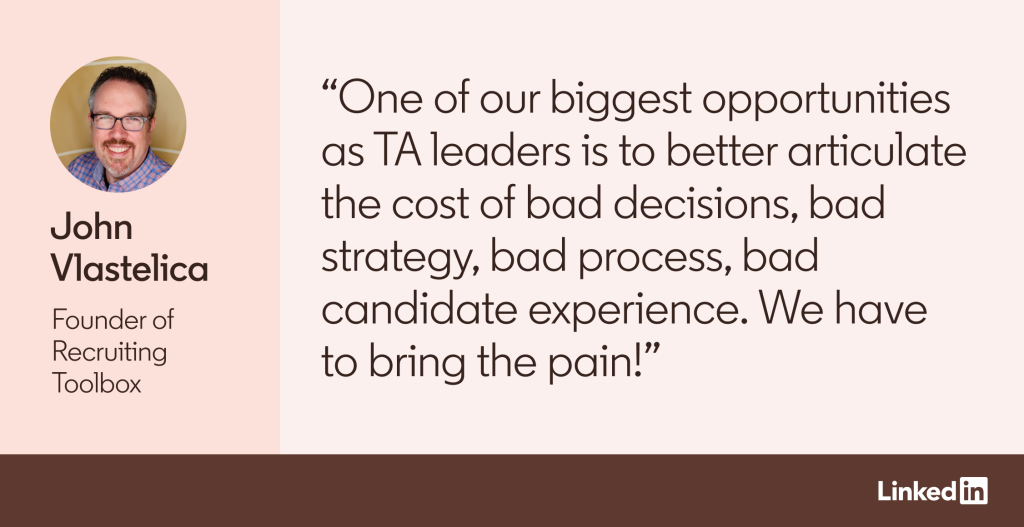Consider the following candidates: a young man with a master’s degree in mathematics from New York University who holds a patent and has passed his Level 1 Chartered Financial Analyst exam. Or a young woman with dual degrees from Pace University who speaks three languages. What do they have in common? Both are recent graduates and neither can find a job.
John York, in the first example, told The New York Times he’d submitted about 400 job applications — to receive only rejections. Lohanny Santos, the Pace graduate, broke down in tears in a viral TikTok video after repeated failed attempts to secure even an in-person, minimum wage job.
While both have valuable skills, they’re also among one of the most overlooked sources of talent right now. According to a new report from Strada Education Foundation and The Burning Glass Institute, 52% of recent four-year college graduates are underemployed — meaning that they’re working in jobs that don’t typically require a bachelor’s degree — a year after they graduate. Black and Latino graduates fare even worse. Meanwhile, another report found that 38% of employers avoid hiring recent college graduates altogether.
“There’s clearly something wrong when young graduates can’t find jobs,” wrote Peter Coy in a recent New York Times article, “at the same time that employers complain about not being able to find qualified workers.”
For talent acquisition professionals, this presents an opportunity. Recent grads — most of them Gen Z — can offer a fresh and new perspective, sharp technological skills, and a passion for learning. What’s more, many of them are truly eager to work.
Here are four ways you can tap into this overlooked talent source now.
1. Remove the “experience needed” requirement from entry-level jobs
Even though the global unemployment rate is low, there are reasons recent grads struggle to find jobs. In the United States at least, more people than ever now have college degrees, which means the competition for college-level jobs has become even more fierce. Fewer people are quitting, so fewer jobs are available. And Goldman Sach’s economic team has found that studying remotely during COVID “may have affected [recent grads’] training, networking, and human and social capital accumulation.”
But one of the toughest challenges young workers face is that job descriptions for “entry-level” jobs often require years of experience. If you search for “entry-level” jobs on LinkedIn, for example, you’ll find many job listings that require at least three to five years of relevant experience.
That presents a catch-22, as the only way recent grads can gain experience is by getting a job.
To make entry-level roles more accessible, remove the experience requirements from your job descriptions and postings. You can do this by identifying entry- and mid-level roles where experience requirements can be removed and emphasize the skills needed for the job instead.
2. Consider skills adjacencies when hiring early-career candidates
What early-career candidates lack in work experience they make up for in fresh skills and a willingness to learn. Their skills may not be evident on their resumes, though, which is why it’s important to also consider skills adjacencies.
Recent graduates with degrees in mathematics, for example, may excel at accounting or data analytics. Communications majors might be good at marketing or social media. Students who organized student clubs or started their own businesses in college might be good for leadership track roles.
You might also want to consider their less tangible skills. Even though people love to disparage Gen Z, this generation has a lot more to offer than employers may realize. Because they grew up during a global recession, political unrest, and a pandemic, they’re highly adaptable and accustomed to navigating uncertainty and embracing change. They’re also resilient. They’ve proven they can thrive, even in adversity. All of these skills are valuable when you’re building agile, innovative teams, capable of thriving in a fast-moving environment.
Plus, recent college grads are the first generation of digital natives. For them, technology isn’t something to learn. It’s how they operate in the world — which means they can adapt quickly to new technologies and platforms.
3. Offer internships, and think about doing them differently
One of the best predictors of whether a recent college graduate will be able to get a college-level job is whether they’ve had an internship. Graduates who have had at least one internship are 48.5% less likely to be underemployed, according to the Strada and Burning Glass report. For Black students, internships are even more crucial.
Despite this, many companies have recently begun hiring fewer interns or rescinding internship offers as a way to cut costs. One source found that postings for internships had dropped 14% between this summer and last.
Cutting internships may be shortsighted. Internships create a pipeline of qualified talent. And a recent LinkedIn report found that former interns who later become employees are more likely to stay with the company, boosting retention and reducing recruiting costs.
Rather than cutting internship programs, why not rethink them instead? Companies have spent a lot of money in the past taking interns to extravagant entertainment events or expensive meals, but they could cut back on these “extras” to focus on giving interns what they really need, which is work experience.
To make these programs accessible to all students, not just those from well-resourced families, companies should also consider offering internships that are paid and can offer at least part-time work during the school year. Many college students — often including first-generation students — have to work their way through school and don’t have the luxury of choosing between a job that pays or getting valuable career experience at an internship that does not.
4. Remember that some of the best young workers may not have a degree at all
While recent college graduates are grabbing the headlines right now, there’s another group of young workers who are also overlooked: those who are Skilled Through Alternative Routes (STARs). These workers have graduated from high school and gained skills through boot camps, internships, apprenticeships, certification programs, or military service but don’t have a four-year college degree. In the U.S. alone, there are more than 70 million such workers.
STARs are a compelling argument for skills-based hiring, assessing candidates based on their skills rather than on a degree or pedigree. When you hire for skills, you open doors to individuals from historically marginalized groups who may not have had the chance to go to college — while widening your talent pool at the same time.
Final thoughts: First jobs are critical for younger workers
Companies win when they give younger workers their first good job — recent college grads and STARs are eager to learn and often offer fresh perspectives that can fuel innovation. But young workers, who are the future of the workforce, win even more.
The Strada and Burning Glass report notes that the first job a college graduate gets after school can set the tone for their entire career, even influencing the kind of job they’ll have 10 years later.
Think about that. Offering someone an entry-level position may not seem like a big deal to you. But for a young person, it may literally change their life.










